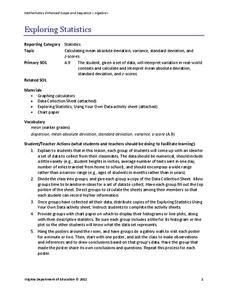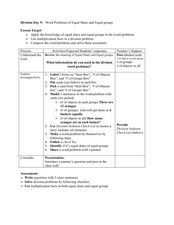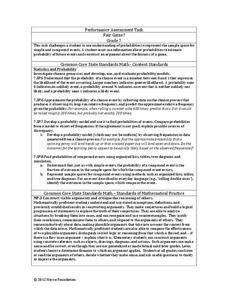Curated OER
The Math Of African Music
Students practice rhythms and fractions on African drums in this Music instructional activity mixing Math skills and music notation. The instructional activity also includes ideas for assessment and state and national benchmarks met.
Curated OER
Math-Geometry: Area and Perimeter
Upper graders measure the area and perimeter of several items. In this area and perimeter lesson, learners engage in measuring area and perimeter in several scenarios. Full-group instruction requires learners to listen to instruction and...
Curated OER
Math Series: Number Patterns
The focus of this math lesson plan is representing numbers in different ways. Young mathematicians practice putting numbers into sets, and arriving at answers in new ways. For example, they are asked to, "Show me how to get 7 eyes." A...
Curated OER
One-To-One: Consumer Math
In this consumer math worksheet, students count the number of butterflies in a group and draw a line to match the same number of flowers in a group. Students match four groups so that there is the same number of butterflies as flowers in...
Curated OER
Math Tag
Young scholars play the game tag inside the classroom with three or four designated 'taggers'. In this math game lesson, students have to solve a math problem to be unfrozen once they are tagged. When the frozen student has...
EngageNY
Fraction Multiplication and the Products of Decimals
Class members come up with a hypothesis on the number of decimal digits in the product of two decimals. Learners work in groups to complete several decimal multiplication problems. The results help groups develop a conjecture on the...
Virginia Department of Education
Exploring Statistics
Collect and analyze data to find out something interesting about classmates. Groups devise a statistical question and collect data from their group members. Individuals then create a display of their data and calculate descriptive...
Virginia Department of Education
Distance and Midpoint Formulas
Small groups work through two guided activities to derive the distance and midpoint formulas for the coordinate plane. The activities begin with concrete examples and move to abstract.
Virginia Department of Education
Similar Triangles
Pupils work in pairs to investigate what it takes to prove that two triangles are similar. They work through various shortcuts to find which are enough to show a similarity relationship between the triangles. Small groups work with the...
EngageNY
The Difference Between Theoretical Probabilities and Estimated Probabilities
Flip a coin to determine whether the probability of heads is one-half. Pupils use simulated data to find the experimental probability of flipping a coin. Participants compare the long run relative frequency with the known theoretical...
EngageNY
Comparing Estimated Probabilities to Probabilities Predicted by a Model
Small groups devise a plan to find the bag that contains the larger percentage of blue chips. they then institute their plans and compare results to the actual quantities in the bags.
EngageNY
Random Sampling
Sample pennies to gain an understanding of their ages. The 16th installment of a 25-part series requires groups to collect samples from a jar of pennies. Pupils compare the distribution of their samples with the distribution of the...
Virginia Department of Education
Exponents and Radicals
What is that fraction doing as an exponent? Fun math games prompt learners to practice evaluating radical expressions and expressions containing rational exponents, both in groups and individually.
Virginia Department of Education
Angles in Polygons
Polygons — it's all about the angles. Groups work with dynamic geometry software to find the sum of the measures of the angles of various polygons. After finding the information for several polygons, the groups generate a formula that...
EngageNY
Real-World Positive and Negative Numbers and Zero II
Continuing from the previous lesson plan in the series, scholars learn to use positive and negative integers to describe real-world situations. In groups, they come up with their own situations for given positive and negative...
K5 Learning
Mixed Practice Word Problems #6
Nine questions make up a mixed practice instructional activity. The word problems require scholars to show what they know about money, addition, subtraction, multiplication, and division using numbers up to 5,300.
EngageNY
Solving Problems by Finding Equivalent Ratios II
Changing ratios make for interesting problems. Pupils solve problems that involve ratios between two quantities that change. Groups use tape diagrams to represent and solve classroom exercises and share their solutions.
EngageNY
Solving Percent Problems
Don't discount how much your pupils understand percents! The 27th lesson in a series of 29 presents a problem to find the cost of a discounted outfit. Small groups determine either the original price or the discount received given the...
Virginia Department of Education
Integers: Addition and Subtraction
Young mathematicians construct their own understanding of integers with an inquiry-based math lesson. Using colored chips to represent positive and negative numbers, children model a series of addition and subtraction problems as...
K5 Learning
Mixed Practice Word Problems #5
Six word problems make up this mixed practice worksheet. Pupils work with money, adding, subtracting, multiplying, and dividing using numbers up to 250.
K5 Learning
Mixed Practice Word Problems #8
Six questions make up a mixed practice worksheet. Scholars use their knowledge of addition, subtraction, multiplication, money, perimeter, ounces, and pounds to solve word problems with numbers up to 66,000.
Curated OER
Word Problems of Equal Share and Equal Groups
Explore this engaging approach to division problem solving with young scholars. They construct story problems after drawing 3 cards that give them a type of object, how many they have of that object, and the number of groups the object...
Curated OER
Math Games for Upper Elementary Students
Keeping skills sharp doesn't have to be a chore. It can be done with math games.
Noyce Foundation
Fair Game?
The game should be fair at all costs. The mini-assessment revolves around the ability to use probabilities to determine whether a game is fair. Individuals determine compound events to calculate simple probabilities and make...
Other popular searches
- Math Grouping
- Math Grouping Numbers
- Math Grouping and Sorting
- Equal Grouping Math
- Math Brackets
- Math Grouping Tens
- Math Grouping Activity
- Math Grouping Worksheets
- Math Cooperative Grouping
- Math Lessons Ncaa Brackets
- Math Counting and Grouping

























